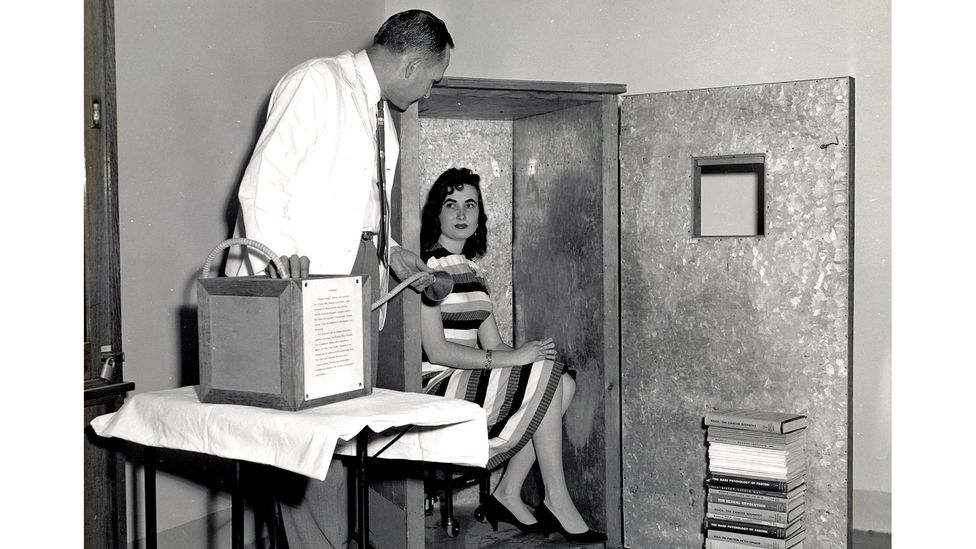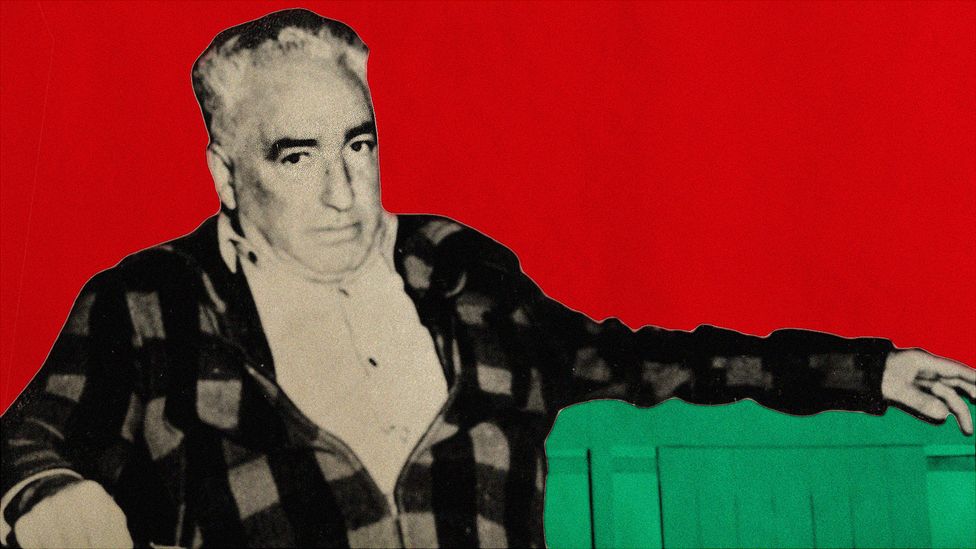Psychoanalyst Wilhelm Reich fell out with Freud, led the 'sexual revolution' and became a hippie icon. As a new book about him comes out, Neil Armstrong explores his life and legacy.
T
The orgasm, it is generally accepted, is A Good Thing. An intensely pleasurable experience that can promote bonding between partners. But might it be even more than that? Do orgasms prevent illness? In fact, are orgasms linked not just to the well-being of the human body but to the health of the body politic? Are they intrinsically anti-fascist? Can they prevent totalitarianism?
More like this:
– How vaginas are losing their stigma
– The cult books that lost their cool
– The best books of the year so far
These were the radical ideas of a maverick psychoanalyst who had a profound influence on popular culture. According to his biographer Christopher Turner, author of Adventures in the Orgasmatron: "In the 1970s, everyone at a Hampstead cocktail party would have heard of him, but he is mostly forgotten now."

Reich's orgone accumulator was a cabinet designed to allow a person to sit inside it and absorb the universe's mysterious life force (Credit: Alamy)
While you might not have heard of Wilhelm Reich, you have probably heard Kate Bush's Cloudbusting or Patti Smith's Birdland, two songs about him. And you have heard of writers such as Jack Kerouac, William Burroughs, Saul Bellow and Norman Mailer, who were all fascinated by him. And you will be familiar with the term "sexual revolution", which Reich coined. And now a new book may revive Reich as a topic of cocktail party conversation. Everybody, by Olivia Laing, uses his life and work as a framework for a meditation on bodily freedom.
"I think Reich is an immensely complicated figure, but his complexity is not a reason to reject him outright," Laing tells BBC Culture. "He tried to unite the ideas of Freud and Marx, he was a sexual liberationist who truly believed in women's right to pleasure, and he rooted his ideas about freedom in the body itself, which he saw as both repository of trauma and agent of change."
Reich was born in 1897 into a wealthy family in what is now Ukraine. He claimed to have lost his virginity at the age of 11 to the family cook and to have visited a brothel at the age of 15. After serving in the Austro-Hungarian Army in World War One, he studied medicine in Vienna. When he heard of a seminar on sex being given by Sigmund Freud, the founder of psychoanalysis, he visited him to ask for a reading list and the pair hit it off. Freud began referring patients to him and Reich started developing his own theories, becoming convinced of the power of sexual healing. Laing explains his reasoning: "If undischarged sexual energy caused neurosis, mightn't it follow that the discharge of sexual energy was in itself a healing force?" By the time Reich wrote The Function of the Orgasm in 1926, he was convinced that good quality sexual climaxes promoted physical health. When Reich gave Freud a copy of The Function of the Orgasm, the sceptical older man muttered: "That thick?" The pair would eventually fall out over their differing views. In a letter to another psychoanalyst, Freud referred to Reich as an "impetuous young man, passionately devoted to his hobbyhorse, who now salutes in the genital orgasm the antidote to every neurosis". When Freud developed cancer, Reich regarded it as the result of sexual frustration.
His eccentric theories
Just before World War Two Reich fled to the US, where his ideas became increasingly eccentric. He discovered a mysterious life force that permeated the universe and flowed through the atmosphere in currents. He called it "orgone" and designed a cabinet – the "orgone accumulator" – in which a person could sit and soak up this energy. It was roughly the size of a public telephone box and made of wood packed with layers of wire wool and sheep's wool, which absorbed and then trapped the energy – like a greenhouse. Reich thought spells in the box would cure cancer. In 1941, he visited Albert Einstein at his New Jersey home and spent hours propounding his theories to the great physicist. Einstein listened politely but, unsurprisingly, was unconvinced. People think I'm crazy, Reich protested to Einstein. "I can believe that," responded the scientist.
In fact, Reich did become increasingly paranoid and delusional. He discovered that there were dangerous fields of negative orgone energy and invented a "cloudbuster" to break them up. It was a collection of long pipes and looked something like an anti-aircraft gun. One of its supposed effects was to make it rain. He also became convinced that he was under attack from UFOs.
The US authorities took a dim view of Reich's claims about the powers of the accumulator, and the fact that he had embraced Marxism and joined the Communist Party in Austria in 1928 made him an even more suspicious figure in the eyes of the FBI. Some unhelpful press articles depicted him as a foreign undesirable, accusing him of quackery and of being the leader of a sex cult. Reich was ordered to stop selling accumulators and was subsequently arrested and imprisoned in 1956 for breaking the injunction. Tons of his papers and books, including The Mass Psychology of Fascism, which linked fascism to sexual repression, were seized and burned. According to Laing, "it remains the only nationally-sanctioned book-burning in American history". He died in prison in 1957.

In the 1968 student protests in Paris, protestors scrawled Reichian slogans on the walls of the Sorbonne (Credit: Alamy)
But by then translations of his work had been taken up by the bohemian intelligentsia. Norman Mailer's influential 1957 essay The White Negro owed a huge debt to Reich's ideas about the orgasm. An orgone accumulator features in Kerouac's On The Road, used by the character who represents Burroughs. Burroughs himself, author of semi-autobiographical novels such as Junky and Naked Lunch and hero of the counterculture, was evangelical about the device and built several.
"When I went into the accumulator and sat down I noticed a special silence that you sometimes feel in deep woods, sometimes on a city street, a hum that is more a rhythmic vibration than a sound. My skin prickled and I experienced an aphrodisiac effect similar to good strong weed. No doubt about it, orgones are as definite a force as electricity," he wrote in Junky.
"After the radical left lost faith in communism in the post-war period, Reich was their next enthusiasm," explains Turner. "His work – in celebrating the anarchy of the orgasm, and the personal politics of hedonism – justified the retreat from conventional politics into what Norman Mailer called 'the rebellious imperatives of the self'.
"Reich's tastes were largely 19th Century – Wagner, Ibsen etc – and, though hailed as the leader of 'the new cult of sex and anarchy', he had little sympathy or affinity to the work of those beatniks who were devouring his own books so enthusiastically in the late 1940s and early 50s. He was a charismatic, larger-than-life figure who built a teetering, alternative, fantasy world that he refused to adapt to reality, despite numerous refutations of his theories (by Einstein [among others]). His disciples and acolytes helped prop that termite mound up."
His star fans
Reich's fame grew to the point where, in January 1964, Time magazine published a long article declaring: "Dr Wilhelm Reich may have been a prophet. For now it sometimes seems that all America is one big Orgone Box…" Burroughs invited Jimmy Page to try one out in 1975 when he was interviewing the Led Zeppelin guitarist for a magazine. Page, no stranger to esoteric thought himself, reportedly declined. However Nirvana's Kurt Cobain was happy to be photographed inside one of Burroughs' accumulators when he visited the writer in 1993.
The orgone accumulator was supposedly the inspiration for the "Excessive Machine" in the 1968 Jane Fonda film, Barbarella, and the Orgasmatron in Woody Allen's 1973 film Sleeper. The space-rock outfit Hawkwind had an anthemic freeform epic called Orgone Accumulator ("I've got an orgone accumulator, It'll make you feel greater, I'll see you sometime later, When I'm through with my accumulator"). A book offering instructions on how to build an accumulator is currently available to buy online. A review erroneously declares that the devices can cure cancer.

Kate Bush was inspired to write the song Cloudbusting after reading the memoir of Reich's son Peter (Credit: Alamy)
Reich also believed in, as Turner puts it, "the idea of sexual liberation as a coherent strategy to oppose totalitarianism". It is an idea that was reflected in George Orwell's 1949 novel, Nineteen Eighty-Four. "We shall abolish the orgasm," O'Brien tells Winston. "Our neurologists are at work upon it now." Winston's girlfriend Julia, an orgasm enthusiast, explains why the Party is anti-sex. "If you're happy inside yourself, why should you get excited about Big Brother and the Three-Year Plans and the Two Minutes Hate and all the rest of their bloody rot?" (We don't know for certain whether Orwell read Reich, but we do know that he read a piece about Reich, and other psychoanalysts, and used it as an example of bad writing in his 1946 essay, Politics and the English Language.)
During the 1960s and 1970s, Reich became a totemic figure for hippies and dreamers, thanks to the particular set of values he represented – as Mark Pilkington, an author and the founder of Strange Attractor Press, a publisher specialising in books "from the outer edge", explains. "Reich's mix of patrician intellectual respectability and fiercely anti-authoritarian politics, combined with his rallying cry for radical sexuality as the path to liberation, his later parascientific ideas about orgone and UFOs, and his tragic death at the hands of the American authorities", all made him the perfect countercultural icon, he says.
In 1968, protesting students in Paris scrawled Reichian slogans on the walls of the Sorbonne, and in Berlin they hurled copies of The Mass Psychology of Fascism at the cops. Feminists of the 1970s such as Germaine Greer were influenced by his thinking. Meanwhile his ideas were typically popular in the communes that began to flourish around this period, especially ones espousing "free love".
"[His] sexual politics began to be lived out in experimental communities and gradually became more accepted by, perhaps even integrated into wider society, so his more far out ideas spoke to people looking beyond the scientific orthodoxies for answers to the mysteries of the universe," says Pilkington. "Were UFOs projections from the unconscious mind? Could we manipulate the weather by channelling the life force that surrounds us? Reich's background in psychoanalysis gave these essentially magical, vitalist ideas a veneer of scientific respectability."
In 1973, his legacy was given another lease of life when his son Peter wrote a memoir of life at "Orgonon", the estate in Maine where he had lived with his father. A Book of Dreams inspired Birdland, on Patti Smith's 1975 album, Horses. In the song, Peter imagines his late father is coming to collect him in a UFO. Kate Bush also read the book and was moved to write Cloudbusting (first line: "I still dream of Orgonon") for her seminal 1985 album, Hounds of Love. In the accompanying video, made with the input of Terry Gilliam, Bush is Peter, and Wilhelm is played by Donald Sutherland who had drawn upon The Mass Psychology of Fascism for Bernardo Bertolucci's film 1900, in which he played a brutal Italian fascist. In Bush's video, Wilhelm and Peter push their cloudbuster – designed by creatives who had worked on Alien – up a hill but Reich is arrested and taken away.
"I think Kate Bush and Patti Smith were moved by the tragedy of Reich's story – neither of those songs are really about sex so much as the pursuit of freedom," says Laing. "Reich had the misfortune to be taken up posthumously by some fairly loathsome men, who helped create this lasting image of the 'orgasm man'. But as the feminists who drew on him attest, his work is much more an attack of patriarchy than the likes of Norman Mailer or Woody Allen perhaps noticed."
"It's interesting that Reich doesn't seem to feature so much in alternative cultural discussions now," says Pilkington, "though there are still people working with variants of his therapeutic ideas – I know a couple personally. When Reich is discussed the emphasis seems to be much more on the politics and tragedy of his later life, rather than his ideas."
But perhaps the writers and musicians of today will read Laing's book and rediscover "the orgasm man".
If you would like to comment on this story or anything else you have seen on BBC Culture, head over to our Facebook page or message us on Twitter.
And if you liked this story, sign up for the weekly bbc.com features newsletter, called The Essential List. A handpicked selection of stories from BBC Future, Culture, Worklife and Travel, delivered to your inbox every Friday.
